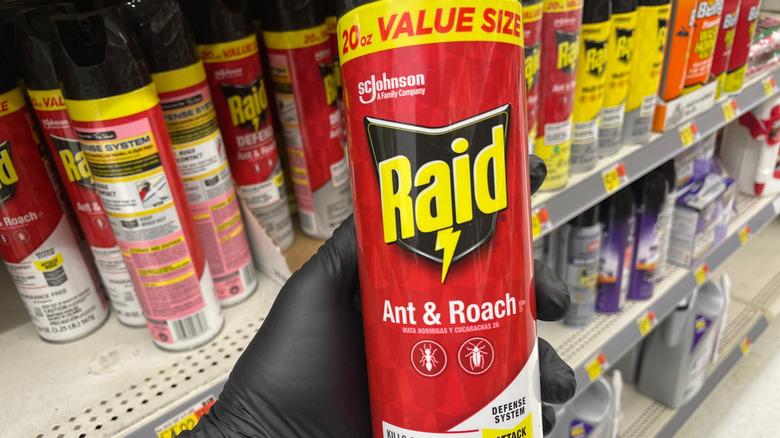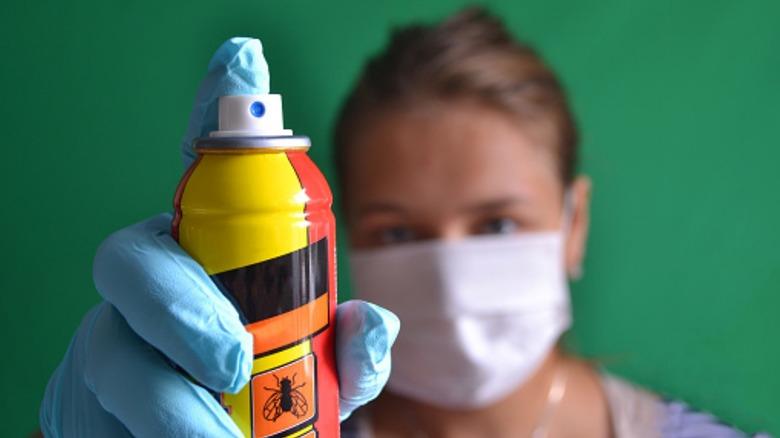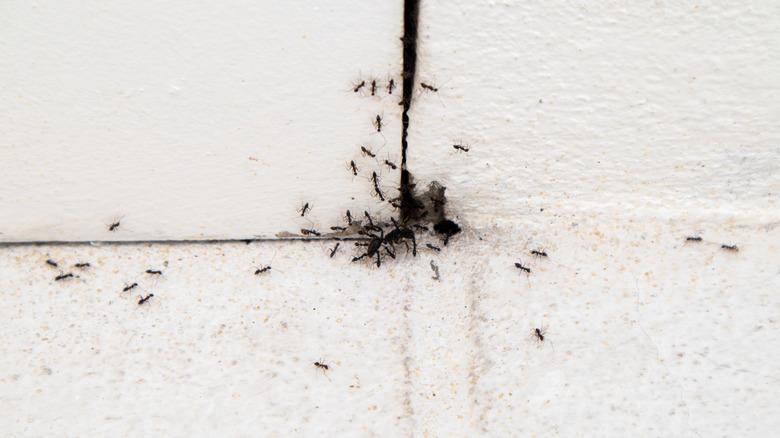Why You Might Want To Think Twice Before Using Raid Spray To Bug-Proof Your Home
When you notice creepy crawlies have made their way into your home, your first instinct is likely to reach for the well-known bug killer known as Raid. Available in many different formulas to target various insects such as ants, cockroaches, wasps, and more, Raid offers products in convenient aerosol bottles that can get rid of insects like ants fast, making it a household staple for many folks. But you may want to reconsider reaching for Raid the next time you see an ant on the countertop or a wasp nest attached to your roof.
The most common critique of Raid is its negative health impacts, which can be severe, especially for children and pets. Some environmental studies have also found that pyrethrins and pyrethroids, the active ingredients found in many Raid formulas, can accumulate in water systems and soil, which can harm animals and natural environments. If that weren't enough to steer you away from Raid products, it's worth noting that there are far bar better chemical-free and natural pest control remedies out there, such as fixing gaps in doors and making sure to wipe down for crumbs after each meal. And for those still after a chemical solution, there are far less toxic insecticides to use like boric acid and diatomaceous earth. Ultimately, in many cases, the risks outweigh the benefits of using Raid, especially when there are so many great alternatives out there. We'll walk you through the actual downsides of using Raid, and provide several alternatives to help you eliminate pests from your home.
The health and environmental risks associated with Raid
With so much misinformation out there, it's easy to be a little skeptical when you're told a very popular product is bad for human health and the environment. However, there are a number of studies that indicate this is the case for Raid products. Simply having a bottle of Raid in your cupboard isn't necessarily risky, it's more about what happens when you spray it.
According to Raid's own instructions for safe use of its Ant and Roach formula, you must "cover or remove exposed food, dishes, utensils, and food handling equipment" and keep all family members away from the area until the spray has dried fully. If you see a cockroach in the kitchen, for instance, you may quickly spray at it, not taking time to cover up any exposed food, or make sure your family members are sequestered to another part of the house until the spray dries fully. Ingesting or inhaling Raid can result in dizziness, headache, and nausea, and even neurological symptoms in larger amounts, such as muscle twitches and loss of consciousness.
Additionally, we can't ignore the possible environmental dangers posed by these chemicals. One study published in the journal for Environmental Science and Technology found that despite being thought of as biodegradable, nearly half of the study's water samples showed traces of pyrethrins and pyrethroids. This means that it's possible that these chemicals can contribute to stream toxicity across the country, creating a negative impact on marine life.
Raid isn't a longterm solution anyway
After spraying Raid directly on an insect, you may be shocked to see how quickly it works to kill them. Although Raid can be used indirectly to get rid of some pests, this really only holds true for some types, such as ants and roaches, it's ineffective against others unless sprayed directly. Even then, Raid's effectiveness only lasts for 13 weeks at most, requiring reapplication if the infestation continues. In combination with the negative health impact, there is good reason to avoid spraying the perimeter of your house down with Raid as a long-term treatment and prevention plan.
Ultimately, the best way to treat infestations is to target the problems that are drawing pests in. This can include a number of simple house maintenance steps, like filling in gaps between doors and windows, storing food in air-tight containers, and fixing leaky plumbing — these are just a few of the foolproof ways to stop pests from invading your home.
Consider using less toxic treatments for bug-proofing the home, too. Boric acid does a terrific job of killing off bugs when ingested, and can even kill insects such as termites, ants, roaches, bed bugs, and silverfish. It's also considered generally safe to use in households with children and pets. Food grade diatomaceous earth, which is essentially ground-up plankton fossils, is also great against scarier crawlers like scorpions, and generally safe for mammals to ingest in small quantities.


